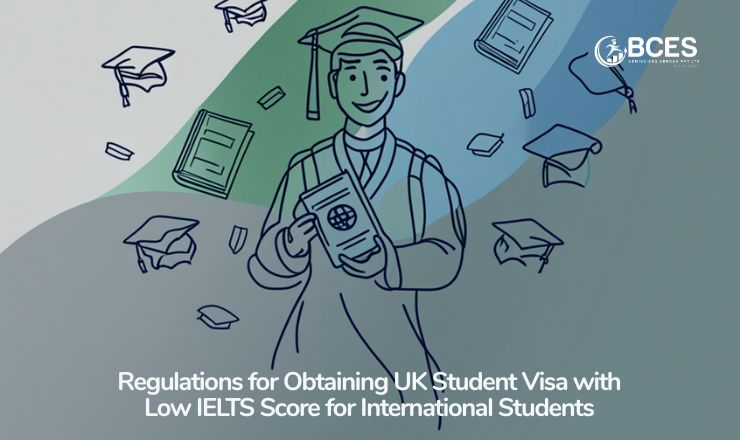Regulations for Obtaining UK Student Visa with Low IELTS Score for International Students

14 August 2025
If you aspire to study in the UK but your IELTS is disappointing, don’t worry—your door is not yet closed. BCES Admissions Abroad have witnessed numerous students realizing their UK study ambitions even after performing poorly on English exams. With proper strategy, you can still pass university admission requirements, obtain your visa, and start your British studies.
In 2025, English language testing in UK universities and visa centers has relaxed, providing alternative methods to demonstrate your language ability. This guide will introduce you to effective, student-oriented advice to convert a low IELTS score into a chance.
Reasons Why a Low IELTS Score Cannot Be Treated as Final
Even though the UK Home Office does demand English language proficiency, it is up to individual universities what they demand. Most of them now accept alternatives like the Duolingo English Test, PTE Academic, TOEFL, or even internal tests. Others provide the possibility of taking an English preparation course before your main program.
This flexibility ensures that your IELTS score is only one aspect of the overall picture—not the sole determining factor.
- Enroll in Pre-Sessional English Programs
Some UK universities offer pre-sessional English courses—short, intensive courses in which you can develop your language and study skills before beginning your principal course. They can be between 4 and 12 weeks and are usually accepted as evidence of English language proficiency for visa purposes. Passing such a course could be your golden ticket to joining your preferred degree without having to re-sit IELTS.
- Utilize Proof of Previous English Education
If you have studied in an English-speaking nation or your prior qualifications had been entirely conducted in English, you are exempted from further higher IELTS requirements. A formal letter from your prior education institution stating English as the medium of instruction is being accepted in a few universities. This would particularly be helpful for students having academic or professional experiences in English settings.
- Explore Other English Language Tests
UK universities have also expanded the list of accepted English tests in recent years. Duolingo English Test, PTE Academic, or TOEFL iBT can all be utilized to assist with meeting entry requirements in the case where IELTS is not your best subject. These tests are all online, low in cost, and provide quick results—perfect for close application deadlines.
- Enhance Your Application with Additional Qualifications
If your English score is below expectations, excel elsewhere. A strong personal statement, strong letters of recommendation, and a strong academic record can make a big difference. Admission committees will look at your overall potential instead of focusing too much on one score. Highlight your motivation, relevant experiences, and clearly defined career aspirations to show them that you are qualified to study academically in the UK.
- Work with BCES Admissions Internationally
At BCES Admissions Abroad, we are committed to helping students overcome issues like poor IELTS scores. Our experts will:
- Identify institutions that accept alternative evidence of English
- Support with pre-sessional course applications
- Prepare you for university-specific interviews or tests
- Ensure that your visa application is UKVI compliant
By following our instructions, you will receive a clear-cut, step-by-step plan for building your profile and boosting your chances for success.
The majority of universities in the United Kingdom have made conditional offers on the basis of interviewing, online language tests, and more universal recognition of tests like Duolingo. Pre-sessional entry arrangements have also gained ground across the academic year so that students can start their courses at different points without being disadvantaged by delays.
In case you’re not sure what to do with a low IELTS score, don’t worry, because our experts at BCES Admissions Abroad are here to assist you. From choosing a suitable university to getting your visa documents in order, we will ensure that your application stands out. Reach out to us today at +91 9319996330 and begin your learning experience in the UK with confidence.
Frequently Asked Questions (FAQs)
A: No. Most universities permit alternative tests or taking a pre-sessional course to meet English requirements.
A: It’s a brief course that concentrates on enhancing your language skills before beginning your degree. Passing it can satisfy university and visa language requirements.
A: Indeed, provided that your previous qualification was delivered in English and that it is recognized as valid evidence by the university or UKVI.
A: Duolingo English Test, PTE Academic, and TOEFL iBT are accepted universally in 2025. Institutional requirements are different.
A: Emphasize your academic success, craft a solid personal statement, and obtain top-notch letters of recommendation.
A: Get in touch with us with your profile and aspirations. We will assist you with appropriate solutions and facilitate successful application.